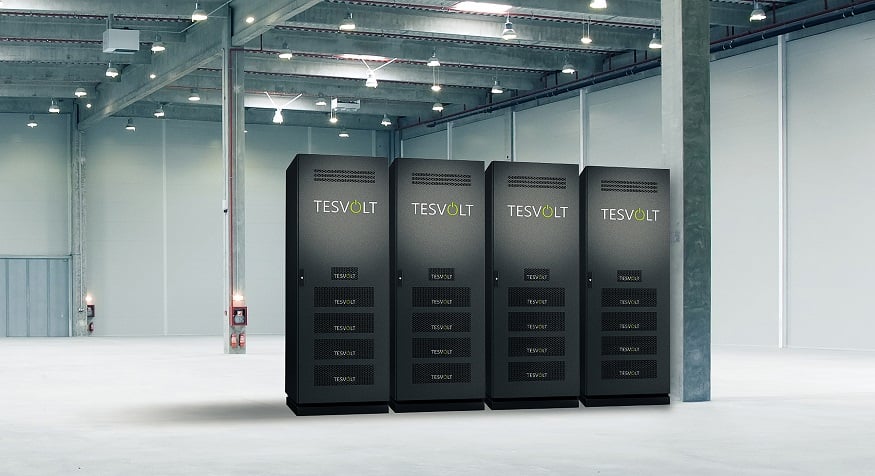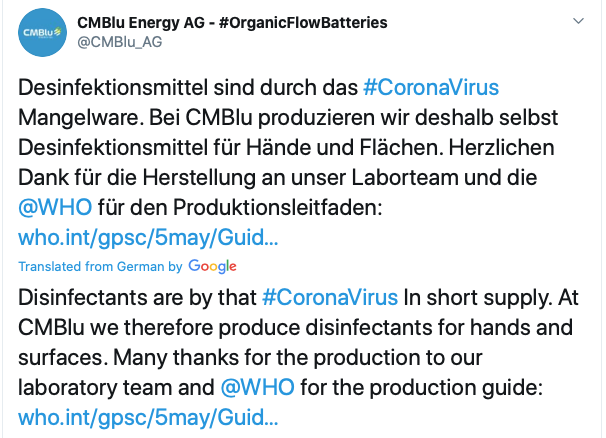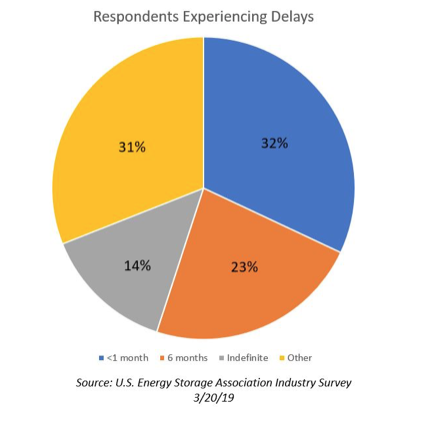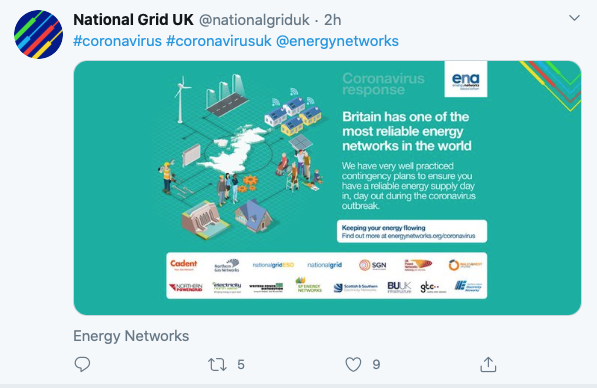While we have avoided risking the spreading of false information or reacting too hastily to an ever-changing situation, here are some of the latest developments. This blog will be updated as and when new information or views arrive.
The cover image was taken at this year's Smart Grid Expo in Tokyo, part of World Smart Energy Week and located alongside PV Expo, Battery Japan and other related events. As you can see, the event was hosted under strict WHO guidelines, meaning that face masks were compulsory while in the expo halls, and thermographic cameras checked each visitor as they entered the halls. Read my blog about the event on PV Tech.
Enjoy 12 months of exclusive analysis
- Regular insight and analysis of the industry’s biggest developments
- In-depth interviews with the industry’s leading figures
- Annual digital subscription to the PV Tech Power journal
- Discounts on Solar Media’s portfolio of events, in-person and virtual
PS: Our colleagues over at PV Tech are also running an industry COVID-19 tracker blog, view it here.
3 April 2020: Community meetings to consult the public for their views on a plan by Hawaiian Electric Company (HECO) to build over 1GWh of battery energy storage across five sites to go alongside a tender for 900MW of renewables will go ahead – but virtually over television and internet.
“We know the community is dealing with a lot right now because of the pandemic, and there is uncertainty on how long this will last. If we could postpone these meetings we would,” Jack Shriver, HECO’s director of generation development said.
The islands of Maui and Hawaii will see their community meetings hosted on a local tv channel, with HECO accepting emailed public input. Plans for Oahu will be hosted via Webex.
Utility representative Shriver said that the potential projects “are under a compressed schedule for permitting and construction. We want to give our communities an early opportunity to provide their feedback on our self-build proposals”.

2 April 2020: Production has begun at commercial energy storage system provider Tesvolt's new factory in Wittemberg, Germany, although workers are said to be strictly adhering to social distancing guidelines.
Office staff have meanwhile switched to remote working. Semi-automated production of systems however, started up at the beginning of this week, with the 12,000 m² of floor space able to produce up to 1MWh of systems a day. Tesvolt has touted it as 'Europe's first commercial storage gigafactory', as the company hopes to scale up as demand grows, to 1GWh, from the initial 255MWh of annual production capacity.
“Employees are still at work but isolated from one another. We’re lucky that production is continuing at our battery cell supplier Samsung SDI in Korea,” company co-founder and director of engineering Simon Schandert said.
1 April 2020: SimpliPhi Power, a maker of energy storage systems based around lithium iron phosphate (LFP) battery chemistry for residential and commercial scale as well as portable power packs and microgrids re-opened its manufacturing operations in Oxnard, California, having made adjustments for workers to be protected from COVID-19.
Following the state-wide “stay at home” order on 19 March, SimpliPhi closed its headquarters including its manufacturing plant, while office staff switched to working remotely from home. With California having ruled that industry sectors involved in energy. emergency response and manufacturing can be considered part of the state’s ‘Essential critical infrastructure workforce’, the company took the decision to “make adjustments to our headquarters and production facilities, following [US] Centre for Disease Control (CDC) guidelines”. The company reopened on Monday (30 March).
31 March 2020: Smarter E Europe event, including Intersolar Europe, ees Europe, cancelled for 2020
Intersolar Europe 2020 and ees Europe have been cancelled as Europe continues to battle against the ongoing COVID-19 outbreak, organisers Solar Promotion GmbH and FWTM GmbH have announced.
Intersolar Europe is the continent's largest solar trade exhibition and a mainstay in the calendars of solar professionals. It had been scheduled to take place on 17 – 19 June 2020. However, the decision has now been taken to cancel this year’s edition of the exhibition and instead wait until June 2021 to hold it again. Energy-storage.news media partner event, the co-located ees Europe show is newer but has grown in size over the past few years.
30 March 2020: Several energy storage companies have turned their equipment lines or supply chains to helping serve critical needs in response to the COVID-19 situation worldwide.
Tesla's boss Elon Musk has garnered some attention for offering to make and supply ventilators (the company has reportedly also already started delivering ventilators from existing manufacturers), while others such as BYD in China have started making surgical protective masks, as reported below.
Today, European organic flow battery startup CM Blu tweeted that it has used the World Health Organisation (WHO) guide posted online to start making disinfectant.
Click here for the WHO Guide to Local Production: WHO-recommended Handrub Formulations.
See tweet below & a picture of CM Blu's disinfectant. Credit: CM Blu via Twitter.


30 March 2020: Lindsay Gorrill, CEO of US-headquartered battery storage manufacturing start-up KOORE Power published a note late last week detailing the situation around COVID-19 as it impacts his company.
After an opening address acknowledging the paramount importance of the “mental and physical health of American and global citizens,” and going on to thank medical responders and other key members of society for “working hard each day to keep society moving forward,” Gorrill acknowledged that the energy storage sector is facing challenges within the supply chain as a result of the deadly virus and its impacts.
He said however that KORE Power's supply partner in China, Do-Fluoride Chemicals, has resumed operations “and is presently working to meet KORE Power’s customer orders”.
You can also read Lindsay Gorrill's recent Guest Blog for this site about how industrial energy storage can help fuel job creation as well as powering up the clean energy transition, here.
26 March 2020: ENGIE EPS said that the novel coronavirus’s outbreak is having an impact on “both the industrial operations of ENGIE EPS and its short-term business prospects and it is still too early to assess its full impact”.
In a regulatory release, the energy storage, e-mobility and microgrid tech company went on to say that it is at present unable to confirm its June 2019 revenue guidance of €40 million (US$43.89 million) for 2020 will be met. Majority-owned by ENGIE since early 2018, ENGIE EPS said that it will advise on its €100 million revenue guidance for 2022 once the COVID-19 situation has been overcome.
While it is active in various territories globally, the company did say however in a statement issued after an earnings release that the Italian government has ruled that its activities that encompass electrical systems development and R&D can be considered essential and may continue through the ongoing government lockdown.
25 March 2020: Work installing and maintaining solar PV and energy storage systems can carry on in California amid the statewide “Shelter in place” directive from the Office of Public Health, according to the California Solar + Storage Association (CALSSA).
The association’s dedicated resources page for COVID-19 advicereferred to a list issued by the State of California of ‘Essential Critical Infrastructure Workers’. It includes electricians and those in the construction industry, particularly those providing services that are “necessary to maintaining the safety, sanitation and essential operation of residences”.
Meanwhile, ElectrIQ, a residential battery system provider headquartered in the state told Energy-Storage.news that while installs are continuing – while workers adhere to strict guidelines that include maintaining 6 feet distances between each other – permitting delays and homeowner reluctance to allow crews onsite are also occuring.
ElectrIQ also said however that customer and installer interest in energy storage systems appears to be heightened as the benefits of resilient power for the home are becoming clear.
25 March 2020: New dates have been announced for trade fair Energy Storage Europe 2020, which was to be held from 10-12 March this year but was of course postponed due to COVID-19.
The event will instead take place next year, from 16-18 March 2021.
The decision has been welcomed by Urban Windelen, CEO of the German Energy Storage Association (BVES), which like this site, is a partner to the event.
“We expressly welcome the fact that (organiser) Messe Düsseldorf had the courage to take this step and that together we can now also give a clear perspective for 2021. Planning security is entirely in the interests of the energy storage industry. In our opinion, Energy Storage Europe has reacted cautiously, sensibly and correctly, taking all advantages and disadvantages into consideration,” Windelen said.
24 March 2020: The energy storage industry in the US is experiencing delays and could be staring in the face of potential job losses, according to results coming in for the poll conducted by the national Energy Storage Association (ESA).
The association had sent out a short survey last Wednesday, 18 March finding out from 175 respondents that “the impact has been immediate and potentially devastating to our industry”.
Almost two-thirds (62%) of respondents are “already experiencing delays in project development,” while an actual two-thirds (66%) expect to “incur delays soon”. See the chart below.
The association recommended the following near-term options for providing economic stimulus. Some of these were included in a letter to Congress that the ESA signed along with the Solar Energy Industries’ Association (SEIA) and four other clean energy industry groups.

23 March 2020: High-tech manufacturing equipment supplier Manz AG, which serves the lithium-ion battery and energy storage system manufacture sectors as well as other industries, has said that operations have been suspended at two sites in Germany and its site in Italy until Easter.
Manz AG said it “will suspend business operations at its German locations in Reutlingen and Tübingen and its Italian location for around three weeks as a result of current Covid19 developments in Europe and the measures prescribed and recommended by the German federal government and the European Commission,” in a statement sent to Energy-Storage.news on Friday, while office staff will be working remotely.
Affecting some 550 employees, CEO Dieter Manz said that the company has “decided to shut down business operations in an orderly manner and to suspend them from the coming week until 9 April 2020 inclusive. The affected sites have a strong focus on research and development activities that cannot be efficiently carried out in the home office without the appropriate infrastructure”.
The company does however intend to release its financial forecast for 2020 on 26 March as planned, and noted that “the Management Board does not currently see any significant negative effects on the previous planning for the 2020 financial year as a result of the measures taken,” due to “well-filled order books”.
Energy-Storage.news has asked Manz AG for clarification if possible on the impact on the energy storage segment of its operations. The company has said that business operations at its other locations in Taiwan, China (Suzhou), Hungary and Slovakia, “will remain unchanged”.
23 March 2020: Force majeure clauses have been invoked in a number of locations regarding the impacts of COVID-19, including India's PV industry, as reported today over on PV Tech.
International law firm Gowling WLG has offered a note on the subject for “businesses who are seeing unprecedented effects across their operations, including through their supply chains,” written by London-based head of commercial contracts, David Lowe.
Lowe's note explains what force majeure entails and the ramifications and is definitely worth a read on the company's website.
23 March 2020: We've received notice from a variety of organisations in the US, Australia and the UK as well as mainland Europe that office workers have been moved to work remotely from home.
The trade association and technology / business accelerator group NY-BEST, which of course, as the name implies, is based in New York, also emailed to let us know that it has opened up this online COVID-19 Resource Center on its website. NY-BEST's Government Affairs Partner, CMHS, also helped put it together. The organisation said it will be updating the website and content regularly.
NY-BEST also passed on links to the following government updates at both Federal and state level, courtesy of consultancy Capitol Hill Management Services:
“To ensure the safety and health of our staff and in compliance with Federal, State and local directives, earlier this week NY-BEST converted to remote operations. We are fully able to continue our operation and we are here to provide our members with uninterrupted service as our nation combats COVID-19,” NY-BEST executive director Dr William Acker said.
“I hope you are all well and safe.”
23 March 2020: Another industry event postponement – All-Energy and Dcarbonise 2020, taking place in Scotland has new dates; 14-15 September 2020 at the Scottish Event Campus (SEC), Glasgow.
Original dates for the event, which attracted nearly 8,000 visitors last year, were set for 13-14 May 2020.
“Whilst it is hugely disappointing to postpone the event, and not a decision we have taken lightly, this is an unprecedented time for everyone and we believe it is the only course of action for all involved, given the ongoing developments and concerns related to COVID-19,” John Heastie, portfolio director at organiser Reed Exhibitions, said in a statement.
Energy-Storage.news is a media partner to the event. Visit the website for more details.
20 March 2020: Many network providers – and utilities – from around the world have offered a variation on this tweet from National Grid in the UK, where it acts as the main transmission system operator (TSO). In case your browser doesn't display that message below, it said that it has “very well-practised contingency plans to ensure you have a reliable energy supply day in, day out, during the coronavirus outbreak. The TSO posted a website URL where those concerned or curious can find out more: energynetworks.org/coronavirus
#coronavirus #coronavirusuk @energynetworks pic.twitter.com/NMWbposaqA
— National Grid UK (@nationalgriduk) March 20, 2020

20 March 2020: The US Energy Storage Association (ESA) was among clean energy groups – six in total including solar (SEIA), wind and hydropower trade associtations – to have sent a letter yesterday to US Congress urging for the extension of project construction deadlines and other measures including a standalone energy storage tax credit, that could help mitigate the impacts of the COVID-19 pandemic on the sector.
letter addressed to Speaker of the House of Representatives Nancy Pelosi, Senate Majority Leader Mitch McConnell, House of Representatives Minority Leader Kevin McCarthy and Senate Minority Leader Chuck Schumer highlights that each of the past five years has seen more than US$50 billion invested in the clean energy sector, calling it “one of the nation’s most important economic drivers”.
Read the full story here.
19 March 2020: Our successful Energy Storage Summit series is holding its first-ever Latin America edition this year as planned, but the dates have now been pushed back from 28-29 April 2020 to 23-24 June 2020.
The venue remains the same, The Clarion, Bogotá, Colombia. As explained on the website (https://storagelatam.solarenergyevents.com/es/)
Due to the escalating COVID-19 situation, we have decided to postpone Energy Storage Latam until 23rd – 24th June 2020.
All registrations, guest invitations and sponsorship contracts will be honoured for the event in June and the venue will remain the same. We are working with speakers to reconfirm their participation and will update the agenda accordingly within the next week.
We apologise for any inconvenience and look forward to seeing you in June.
If you have any questions, please contact [email protected]
19 March 2020: The US national Energy Storage Association (ESA) has requested “urgent responses” to a survey on the impacts of the coronavirus COVID19.
“COVID-19 (Coronavirus) is top-of-mind everywhere. We are running a quick, two-question, anonymous survey of energy storage industry members on how the pandemic is affecting the industry.
We understand that the situation is evolving every day, but we want to know — are you currently facing delays as a result of the virus? Do you expect to face delays?,” ESA asks in an email sent out previewing the survey, which is titled: “Is coronavirus impacting your energy storage projects?”
19 March 2020: Australia's Smart Energy Council webinar held this morning focused mainly on general themes of practising social distancing and follow recommendations from medical experts, as well as acknowledgement of the general disruption to daily life expected in the country and across the world. Council head John Grimes did say that solar (and storage) is perhaps “the best industry you can be in right now,” and while acknowledging the difficult times ahead for all, said companies should be “marketing hard”.
Other key industry points included:
- Market reports on supply and demand are a mixed picture. Regional areas appear to see continuing or even stronger demand than usual, while urban areas less so, but this could be for a variety of reasons, whether it's because rural communities see the value of resiliency or are simply not as affected by the situation already is too early to call.
- Some stocks of equipment may be held up in customs, so wholesalers, installers and others should be patient and keep lines of communication open and well-used.
- The Australian Dollar has fallen over the past month against US and Euro currencies, so changes in the base price will have occurred.
- Commercial and industrial (C&I) tax deductions offered by the government for companies with up to AU$500 million annual turnover to make capital investments present an opportunity for purchases of 30kW to 100kW sized commercial PV systems as well as for batteries. As one participant noted, unlike other equipment purchases, solar systems are not a sunk cost and can offer a return on investment.
- Some companies are indeed stocking up on PV and battery equipment right now the same way that many private citizens are stocking up on essential supplies at home.
- Residential solar retailers and installers were recommended to add battery storage into their quotes, boosting the value of each sale even though volumes of sales may fall.
18 March 2020: Energy storage system manufacturer Powin Energy faced “substantial” impacts on its supply chain from February to early March as supplier operations as well as the US-headquartered company's own assembly facilities slowed to a halt in China.
“It was a pretty tough time, our supply chain team was kind of following every single vendor daily to see what their daily updates were, when they were going to get back to work, what the delivery impacts would be,” Powin Energy vice-president Danny Lu said.
18 March 2020: Head of solar market analysis, Jenny Chase, at Bloomberg New Energy Finance (BloombergNEF) has offered a quick comment on the note below (see 12 March 2020 entry), in which the firm forecasted depressed demand for batteries of between around 3GWh in an optimistic scenario and 9GWh in a more pessimistic scenario. BloombergNEF said however that the worst of supply chain bottlenecks resulting from operations in China running below full capacity appeared to have eased.
Energy-Storage.news had asked BloombergNEF for comment on the likely or possible impact of the COVID19 situation on solar-plus-storage markets.
“I think solar and storage will be subject to many of the same effects as solar – where we expect a global drop in demand for small scale installations from the resulting recession, we don't know where will be worst hit yet.”
Chase clarified that the note previously issued “did not refer to just China, indeed China looks like it has contained this and was never much of a solar and storage market anyway. The big policy change so far has been in China, but that is partly because the Chinese government seems more on top of things generally than in most other countries.”
18 March 2020: Australia's Smart Energy Council will give a free webinar tomorrow (Thursday, 19 March 2020) at 10am Australian Eastern Daylight Time (AEDT), on'COVID-19 and the Household/Commercial Solar and Battery Storage Market'.
Including time alloted for questions and feedback, Smart Energy Council head John Grimes will lead a free webinar that promises attendees will:
– Hear directly from people at the coalface.
– Get the latest market analysis – impacts on supply and demand.
– Find out what’s in store over the next 6 months,
– Help your business survive the next 6 months.
Also participating will be representatives from retailers, installers and distributors. Register here.
17 March 2020: According to a press release sent out last week, Chinese lithium-ion battery, electric vehicle and energy storage system manufacturer BYD has in a short space of time become a prolific maker of surgical masks, claiming to have opened the “world's largest face mask manufacturing plant”.
It produces 5 million masks and 300,000 bottles of disinfectant every day at full capacity – which it is running at. Production lines at one of the company's industrial parks in Shenzhen started up as early as 8 February. The company said hundreds of staff work day and night at the plant. BYD claims that more than 3,000 engineers were involved in setting up the fully-running plant in just two weeks.
“This allows the firm to help alleviate severe shortages that have affected hospitals and agencies across China in the face of the global COVID-19 outbreak,” the release said, while BYD president's office director Sherry Li said that more than 90% of the parts used in the production line are produced by the company itself.
The company is apparently constantly adding new lines, increasing capacity by between 300,000 and 500,000 of the masks each day.
In many parts of Asia, people wear the masks as a matter of courtesy to others when suffering from ailments like colds and hayfever, generally as a form of etiquette and preventing spreading germs or viruses to others, rather than as a direct preventative or self-protective measure.
17 March 2020: Some utilities across the US have said that they will be more lenient with late payments or halt residential power cut-offs for people unable to pay their bills. That’s on the consumer side, what remains to be seen on the procurement side is whether utilities can continue being one of the main driving factors behind growth in the US energy storage space front-of-meter in 2019.
Similarly, sources in Australia reported today that Western Australia’s government will freeze household electricity bills from rising this year with inflation as was expected, along with water charges and car licenses and registration.
17 March 2020: Dan Brouillette, Secretary of Energy for the US said via Twitter that “President Donald Trump and VP Mike Pence continue to do an outstanding job of keeping the American people informed and up-to-date with US efforts to combat COVID-19.”
The Secretary also tweeted official guidelines issued by the Whitehouse along with that statement of praise.
Brouillette was set to be keynote speaker at the US Energy Storage Association’s annual conference in Pittsburgh, which, it seems fair to mention, drew a mixed response from some clean energy commentators when announced. Well, the ESA conference is also now postponed from 8-10 April until later in the year (26-28 August), so we’ll see if the Department of Energy will put Brouillette forward to appear for the rescheduled dates.
12 March 2020: Bloomberg New Energy Finance (BloombergNEF) issued its take on the possible impact of COVID19 on global demand in the clean energy industries via its in-house analysts.
“As of March 12, 2020, it appears likely that the coronavirus outbreak will be a significant global crisis, triggering an economic slowdown,” the note sent to press including Energy-Storage.news said. The impact on the solar industry has been covered by senior news editor Mark Osborne over at PV Tech, but here’s what BloombergNEF had to say about energy storage and related areas including EVs.
-Factories in China, which much of the global supply chain depends on, are restarting work and therefore the supply of key components and equipment is under less pressure than before. Bottlenecks in delivery are likely to be short term. However, BloombergNEF analysts wrote, demand is of more concern as climate and related issues could become de-prioritised by policy-makers.
-Demand for batteries will, in an optimistic scenario modelled by BloombergNEF, be down around 4% from expectations, equivalent to 3GWh of demand and down by as much as 9GWh in a more pessimistic scenario.
This comes after a note a couple of weeks back from fellow – or rival – analysis firm Wood Mackenzie Power & Renewables said that the supply chain impact for lithium batteries coming from China could equal a reduction in 10% this year- around 9GWh. Wood Mackenzie said that lithium iron phosphate (LFP) batteries, made almost exclusively to scale in China, could be among the biggest casualties in supply chain bottlenecks.
LFP batteries are popular with energy storage application developers and system integrators, partly due to their less volatile chemistry than nickel manganese cobalt (NMC) which makes them much less susceptible to fire safety concerns, but also are not used in electric vehicles (EVs), meaning that developers aren’t beholden to the same supply chains.
10-12 March 2020: The planned Energy Storage Europe event, a long-held fixture in the events calendar, hosted each year in Dusseldorf, did not take place. This site is a proud media partner to the event, which has been important not just from an industry point of view but has also hosted appearances from politicians at regional, national and European level. Here’s a couple of blogs from last year’s event, March 2019:
Big tech and new solutions at Energy Storage Europe 2019
Energy Storage Europe: Energy transition needs energy storage
Another Energy-Storage.news media partner organisation, NY-BEST has postponed its Capture the Energy Conference from 1-2 April, putting rescheduled dates out for 5-6 August. As well as being a trade organisation, NY-BEST works hard in accelerating technology and the business of technology in New York. After years of hard work to lay down technical boundaries including perhaps the world’s most stringent fire safety rules, the state has rapidly grown from being a strategic hub for companies to headquarter out of, to a policy-driven market for utility deployments and an economics-driven market for commercial storage. 2020 almost marks NY-BEST's 10th anniversary since its founding.
You can still read our initial reaction piece from 24 February 2020: This was posted as it became clear the crisis unfolding in China would unquestionably have an impact on the rest of the world. My take was that even then it would likely become a global problem rapidly, requiring global cooperation and understanding. Analyst Dimitrios Pappas, analyst at new energy consultancy Delta-EE meanwhile pointed out that the US, the second biggest manufacturer of batteries after China, lags behind six-fold or more in capacity terms, meaning bottlenecks are likely to be acute through the year.
Solar Media Editor-in-Chief Liam Stoker and I discussed these and other impacts of the virus on the clean energy industry including solar on our podcast not long after that.

